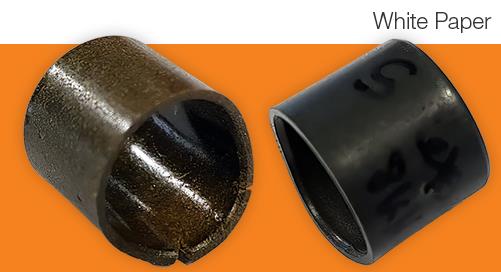6 Lesser-Known Benefits of Engineered Plastic Bearings

Article by Michael Moalli
While the main benefits of engineered plastic bearing materials are well known, this post will explore some of the lesser known benefits and features that engineered plastic bearing materials can provide. Although some of these benefits may be application or industry specific, they are still important factors in fortifying the stance that engineered plastics should replace metal and other common bearing materials in most applications.
1. Electrically-Insulating and Non-Magnetic
Since engineered plastic bearings are made up of a base plastic, reinforcing fibers, and solid lubricants, there are no metal components within the makeup of the material. This means that engineered plastics are both electrically-insulating and non-magnetic, which can prove critical in applications where the bearing will be near electronic components or strong magnetic forces.
2. UV-Resistant
Many engineered plastic materials can stand up to being exposed to UV radiation without any compromise in performance or technical properties. While discoloration in the material is normal, the mechanical and technical properties will remain unchanged.

3. Flexible Machinability

Flexible machinability is critical for any design. Engineered plastics offer the benefit of being relatively easy to machine according to your or your customer's specific design needs. This machining can be done through a supplier, such as igus®, or in-house provided that the proper equipment is available. In addition to machining, there are other methods of customization which could open up new possibilities you might not even be aware of!
4. Regulation Compliance
Engineered Plastic bearings can be used within applications where high levels of hygiene are required without compromising performance of the part or external lubrication. Certain engineered plastic materials can come in direct contact with food and are compliant with current FDA and EC Directives. Due to their UL-94 V0 burn rating and their weight reduction, among other factors, several engineered plastics have been given FAA approval for use within the construction of airplane interiors.

5. Microbial Resistance
Microorganisms in the form of mold, mildew, or bacteria can severely compromise an application, especially within the medical and HVAC industries. Several engineered plastic materials have passed ISO testing for the evaluation of microorganisms on plastic materials, which means that these engineered plastics will resist mold and mildew while not deteriorating or losing any physical properties in the presence of these microorganisms. In applications where antibacterial properties are required, certain engineered plastic bearings materials can be used to reduce the amount of bacterial contamination.

6. Noise Reduction
As metal and other bearing materials wear down, it can lead to a grind or squeaking noise in the application. The vibration dampening and softer material properties of engineered plastics eliminate this concern while still providing the same or better technical benefits.

Everyday across a wide array of industries, there are new materials being created, benefits being discovered, and applications being created that involve engineered plastic bearings. Not only do they provide numerous benefits when being retrofitted into existing applications, they are also changing the way engineers design applications for environments that prohibit grease and other external lubricants, such as food processing, packaging machinery, medical & laboratory instruments, and any industry that involves dirt or dust. We hope that this post has provided you with even more insight into the numerous benefits of engineered plastic bearings!
Contact your local igus® representative for more information about iglide® plastic bearings and to see if igus® can provide its years of expertise in engineered plastic bearings for your application.



